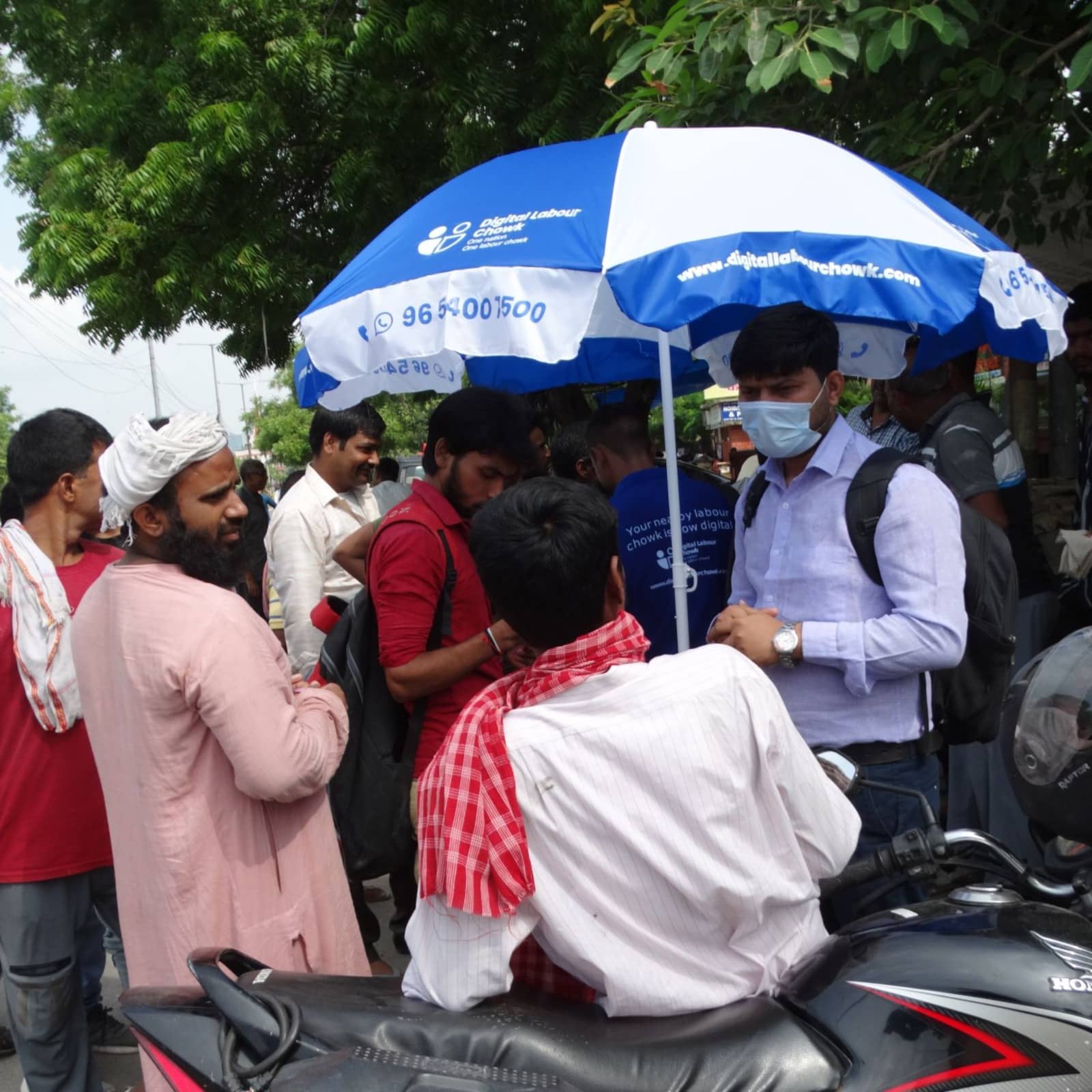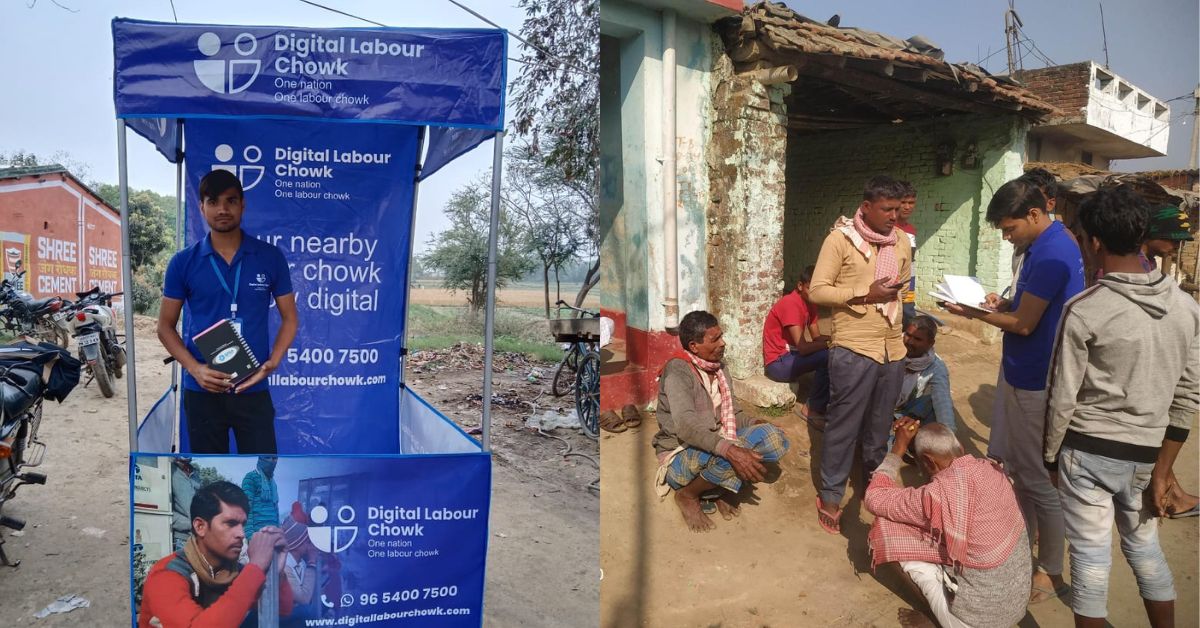January 2020
It was a rainy day in Delhi. Chandrashekar Mandal had just started work at his new finance job and was enjoying a cup of coffee from the balcony of his office on the second floor. As he stood outside, the glaring disparity of life stared back at him.
Here he was, away from the harsh monsoon, in fact enjoying it as a corporate employee. But right in front of his eyes were hundreds of people fighting for a safe space to shelter from the rains in a labour chowk (a place where labourers wait to get hired) opposite his office. These daily wage labourers, waiting in hopes of being hired for the day, scrambled for cover, be it under a tree or a food stall.
Seeing this gave Chandrashekhar flashbacks to his childhood in Bihar, where he had seen his relatives go through the harrowing experience of searching for daily work. “Isn’t there a better way for these workers to find jobs? While the entire world is going digital, why not labour chowks?” he wondered.
Two months later, when the nation went under lockdown, it was these migrant workers who bore the brunt of the crisis. The images of some walking thousands of kilometres to reach their homes still haunt us today. Their plight heightened the 29-year-old’s wish to make their lives better by providing them jobs online, which would accord them dignity.
A year later, true to his word, Chandrashekhar started Digital Labour Chowk — an online platform providing jobs for daily wage labourers, rescuing them from a life of waiting on the streets. Over the past three years, the company has provided a regular income to over one lakh workers, according to him.
Here’s how this boy from Ami village in Darbhanga, Bihar, brought change to the lives of lakhs of migrant labourers.
Why should workers migrate?
Coming from a very rural part of Bihar, in a village that lacked basic facilities like a school post-Class 5, Chandrashekhar was no stranger to poverty. He saw his uncle move to different cities in search of work and was privy to his sufferings.

After getting his first job in Noida, seeing the labour chowk daily on his way to work brought back those memories.
“Almost 100 men and women would gather at that chowk daily, be it in 45 degrees heat or pouring rain. They would be there by 9 am with hopes in their eyes. While some would get work, most would just have their lunch and head back, dejected,” Chandrashekhar tells The Better India.
While seeing this daily sowed the seeds for a venture, what really set the ball rolling was the plight of the migrant workers amid the pandemic. Chandrashekhar went home during the first lockdown. “I used to watch the news and read articles. Every day, I would see lakhs of workers struggling to get back to their hometowns,” adds the entrepreneur.
Watching this might have been very tough for many, but it was a lived reality for millions like Sumit Kumar, a construction worker.
Hailing from Gopalganj, Bihar, Sumit had moved to Mumbai for work. He walked for two days before hitching rides on buses and trucks to reach home, he recalls. “That one week it took to reach home was the worst week of my life. There was nobody willing to help me in the area where I lived. I survived thanks to the benevolence of kind strangers and other workers like me. I vowed never to go back to Mumbai,” he says.
Sumit wasn’t the only one who wished to work near his hometown. The nightmarish experience during the lockdown made many workers desire the same, but where were the jobs?
When the country started opening up slowly, people had to maintain a six-foot distance in public places. How could 100 workers in a small labour chowk maintain distance? To understand their problems in detail, Chandrashekhar spent over four months assessing labour chowks across Bihar, Noida, and Delhi.
India’s construction sector is the country’s second-largest employer after agriculture. According to a report by Knight Frank & RICS, 71 million workers are estimated to be employed in this sector as of 2023, out of which over 80 percent are unskilled. When Chandrashekhar came across this statistic, he knew that there was a major gap that needed to be filled.

“If there are platforms for finding white-collar jobs like Linkedin, Naukri, Indeed, and more, why shouldn’t there be one for blue-collar jobs? I decided to build one and move the physical labour chowks digital. Daily wage workers too should be able to look for jobs from the comfort of their homes,” he says.
Convinced about his idea, he quit his job in September 2020 with Rs 20,000 in his pocket. Having already quit CA preparation after finishing the Inter exams, his family wasn’t very happy. “My father runs a small shop and sent me to Delhi for schooling. He wanted me to study well and find a good job. When I quit and returned home, there was a lot of explaining that I had to do,” he chuckles.
The first few months were difficult as he remembers “looking at the fan” and surviving on the savings he had! Chandrashekhar then started looking for government schemes and loans that he could apply for.
After registering ‘Digital Labour Chowk Private Limited’, he found his first investor in an incubator in Pune. The startup received an investment of Rs 10 lakh in August 2021, kicking off a series of grants and investments.
After building the website and application and taking care of the legal and technical aspects, the founder had a big task in hand: getting customers and workers to sign up. After hiring seven members for his team, the next challenge was wooing the workers.
LinkedIn for blue-collar workers
Since most labour chowks have a mobile shop or small grocery store nearby, Digital Labour Chowk signed up these shop owners as business associates. They would help workers register on the app.
In the summer months, Chandrashekhar and his team campaigned in these labour chowks with 20-litre thermos jars filled with cold drinks like Roohafza. If it was winter, the drink was, of course, chai.
“We spoke to them and explained what we were trying to do. This was an opportunity to escape a life of uncertainty. Since most migrant workers are from Bihar, we explained that they wouldn’t have to migrate all the time,” says Chandrashekhar.
They also set up kiosks in highly populated districts to spread the word. To get contractors, project managers and companies on board, they partnered with builders’ associations and Real Estate Regulatory Authority (RERA) in Bihar and Noida. “We joined over 100 construction groups on Facebook to build contacts and find customers,” he adds.
The platform is built for construction companies and workers, masons, painters, carpenters, etc. When a customer (contractor) signs up, they add details like location, kind of job, wages per day, number of days for which labour is required, and whether accommodation and food are provided.
Workers can access these details and call the job poster directly to express their interest. On the workers’ side, they add details like their skills, past experiences, and minimum wages. Digital Labour Chowk is working to make digital labour cards for these workers, which will provide them with an identity.
“We are also planning to give incentives based on their performance to boost their morale. This is our effort to organise the informal industry,” says the Noida resident.
Customers get 10 connections for free, post which they pay a subscription fee. Digital Labour Chowk is free for workers. The company is also in the process of partnering with institutes to provide upskilling courses for the workers, as there is a dearth of skilled workers.
Shrawan Kumar from Darbhanga has been free of worry for the past year. He was employed by a builder in Jodhpur, Rajasthan, on a long-term contract. “I’ve earned in one year what I used to earn in three years. We also don’t have to stand in the heat daily looking for jobs. When one contract is about to end, we can choose the next one,” he says.
Many of the projects last for at least 21 days, according to Chandrashekhar. He claims that there are 500 to 1,000 jobs posted daily on the app.
Azhar Ansari, who runs an Uttar Pradesh-based construction company, explains that they are always short of manpower. “We are looking for ways to hire workers as we fall short. We just put in our criteria on the app and we get a lot of workers according to the requirements from Digital Labour Chowk. It’s a good effort and makes the hiring process easy,” he says.
Recognised by Startup Bihar, Startup India, Citibank, and more, Chandrashekhar is rearing to go. “I want to provide a credible virtual identity for these workers. The idea is to transform this unorganised, unidentified sector, and provide them visibility,” he says.
Sumit Kumar agrees, as he no longer has to stay away from his family for months, now that he can find options nearby!
Edited by Khushi Arora; Images Courtesy Chandrashekar Mandal
No comments:
Post a Comment